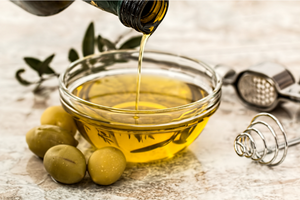Your cart is empty
Already have an account? Log in to check out faster.
Already have an account? Log in to check out faster.

Cooking with oil has been a big part of our culture for years, and it's time to end it. See, the thing is, oil is very inflammatory and can cause major health risks. Because it's our job to teach you how to live an inflammation-free lifestyle, we thought it would be smart to dedicate this post to show you how and why you should ditch the oil.
We will explain what makes an oil inflammatory, why you should avoid it, and a few tips on how to take it out of your cooking routine. Keep reading because trust me when I say these tips will SAVE YOUR LIFE.
We have two words for you - omega 6s. Omega-6s are found in oils such as corn, safflower, sunflower, soy, and vegetable and products made with those oils. Excess consumption of omega-6s can trigger the body to produce pro-inflammatory chemicals, and the American diet tends to be very high in omega-6s.
Consuming an excess of omega-6 fatty acids relative to omega-3 fatty acids can contribute to inflammation, which has been linked to a number of health issues such as heart disease, stroke, and autoimmune disorders. A balanced diet that includes both omega-3 and omega-6 fatty acids in appropriate amounts is important for overall health.
What Is So Bad About Seed Oils? Seed oils, such as soybean, corn, and sunflower oil, have received criticism for their high levels of polyunsaturated fatty acids, which can be harmful when consumed in excess. Some research has linked excessive consumption of polyunsaturated fats to an increased risk of specific health problems, such as inflammation, oxidative stress, and cell damage.
In vitro, animal, and human clinical trials and observational studies show that industrial seed oils are highly reactive and unstable. They contain inflammatory linoleic acid, which is associated with heart disease, cancer, dementia, and other health problems.
There’s no denying that unrefined and cold-pressed oils, such as olive and avocado, can provide beneficial properties like polyphenols, lowering inflammation and good cholesterol.
However, when heated at high temperatures, many of these unrefined oils become unstable, losing nutrients and becoming sources of unnecessary added fat and calories. Oils can even be harmful when heated beyond the smoke point, as they release toxic fumes and carcinogens. This is why these healthier oils are best consumed raw (e.g., as a dressing) or cooked on low heat.
Now, that’s not to say we don’t advocate adding healthy fats to your meals. But just be mindful that cooking oil doesn’t contribute the same health benefits as raw cold-pressed oils and whole food sources of fat like avocados, nuts, or seeds.
The main reason why oil is used in cooking is for non-stick purposes. However, certain cooking methods and modern cookware have made it possible to achieve the same outcome without sacrificing flavor.
Here are some ways you can cook without oil:
If you do prefer to cook with a little bit of oil every once in a while, the best oils to cook with are usually ones that can remain stable at higher temperatures.
We recommend avocado, coconut, and grapeseed oil for cooking purposes.
Cooking without oil has several potential health benefits such as reduced calorie intake, decreased risk of heart disease, improved blood sugar control, lower inflammation and much more. With all of these cooking methods and modern kitchen appliances, there shouldn’t be a need to use oil as a non-sticking agent. Remember to opt for whole foods or raw, unrefined oils for your sources of fat to stay on your journey to better health.
0 comments